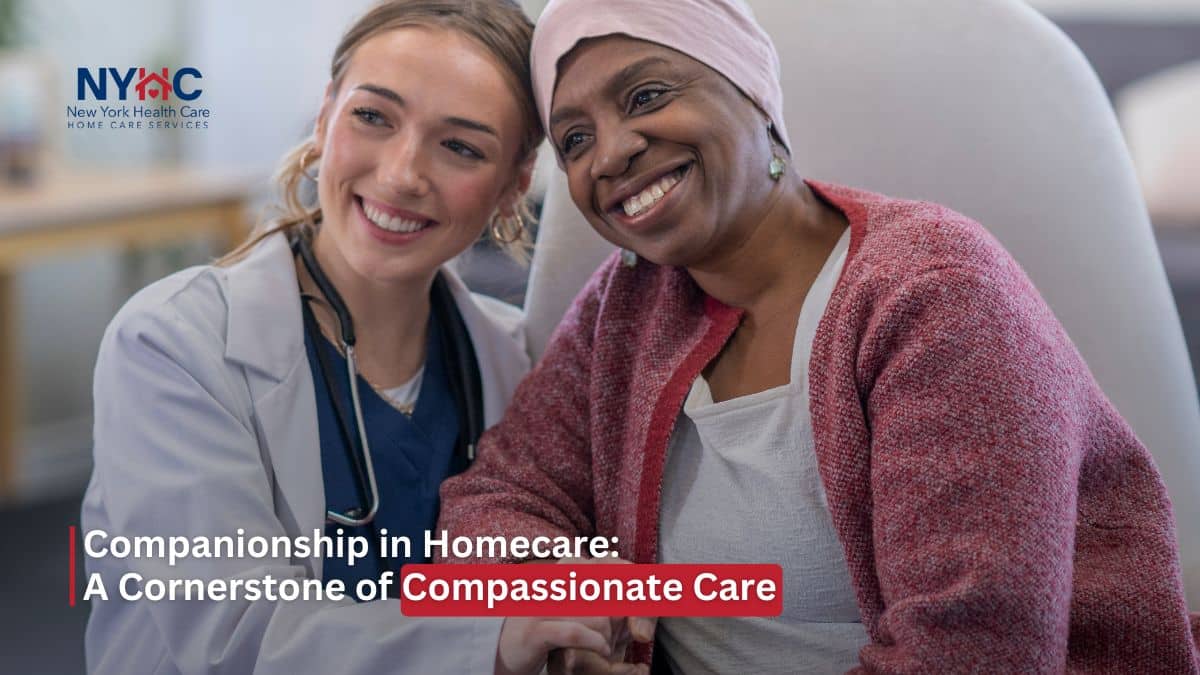As one of the most vibrant and diverse cities in the world, New York City is home to nearly one million people with disabilities, according to the Mayor’s Office for People with Disabilities. These individuals represent approximately 11% of the city’s population, with a wide range of challenges including mobility issues, blindness or low vision, deafness or hearing impairment, developmental disabilities, and learning disabilities. Navigating the complexities of daily life with these challenges can be overwhelming, but there is support available in the form of home care services tailored to individual needs.
At New York Health Care, we understand that the essence of home care goes beyond helping with tasks like meal preparation, dressing, and housekeeping. It’s about offering comfort, emotional support, and a sense of connection—especially for those who may feel isolated due to their disabilities.
The Importance of Companionship in Homecare
Companionship is a key aspect of homecare services, providing both practical help and emotional enrichment. For individuals with disabilities, especially those living alone or away from family, the presence of a compassionate caregiver can make all the difference in their quality of life. Many clients require help with the essential tasks of daily living, but they also need someone who listens, engages, and provides a sense of normalcy and joy.
For those with mobility impairments or sensory challenges, the simple act of having a caring companion to talk to, share stories with, or even play a game can be incredibly uplifting. It brings a sense of community and belonging—something that can be difficult to find when facing a disability. A caregiver at New York Health Care isn’t just there to assist; they’re there to make your loved one feel seen, heard, and appreciated.
How We Provide Compassionate Companionship
At New York Health Care, we believe that every individual deserves more than just a caregiver—they deserve someone who genuinely cares for them, someone who treats them like family. Our approach to companionship starts with understanding each client’s unique needs and preferences.
Companionship in homecare goes beyond the basics. It’s about providing a trusted presence to share conversations, go for walks, or even accompany clients to social events. For individuals who are visually or hearing impaired, this could mean using alternative communication methods. For others, it may simply be the joy of companionship through shared activities like watching TV, listening to music.
Our caregivers offer more than just assistance; they provide emotional comfort and the opportunity for meaningful social interaction. Whether it’s offering a warm smile or just sitting together, the goal is to alleviate feelings of loneliness, stress, and isolation.
Supporting Independence with Empathy
A key element of homecare is empowering individuals to maintain as much independence as possible. Companionship doesn’t mean taking over someone’s life, but rather offering the support they need to feel confident and capable in their daily routines. Whether it’s helping with meal preparation or simply being there to encourage a walk in the park, our caregivers make sure that each client feels supported without losing their autonomy.
We know that every person is different, and so is their need for support. Some people may require full assistance with personal care, while others just need a little extra help around the house. At New York Health Care, we create personalized care plans that are centered around our clients’ preferences, ensuring that companionship, care, and respect are always at the forefront of what we do.
Why Compassionate Care Matters
Providing compassionate care is not just a job. It’s a philosophy that shapes how we serve our clients and their families. At New York Health Care, we take the responsibility of caregiving seriously. We know that our clients depend on us not only for physical help but also for emotional well-being.
When we say “your family is our family,” we mean it. We go the extra mile to ensure that each individual feels valued, cared for, and, most importantly, understood.
Conclusion
The role of companionship in homecare cannot be overstated. New York Health Care is committed to offering care that goes beyond the ordinary. Our caregivers offer companionship that gives individuals with disabilities the emotional and social support they need to thrive in their homes and communities.
If you or a loved one needs help navigating daily life with a disability, we’re here to help.

